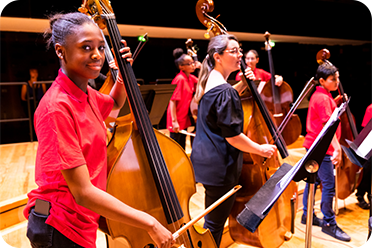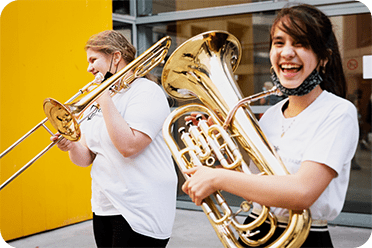Démos is making music a vector for social cohesion
In 2021, TotalEnergies Foundation renewed its three-year support for the Démos program. The objective is to encourage young people in socially vulnerable situations or far from cultural events, to take up a musical instrument and continue to play in the long-term.
Since 2010, 10,000 children have participated in the Démos program. This Socially-oriented Musical and Orchestral Education Program, overseen by the Philharmonie de Paris, has already seen the creation of about fifty orchestras throughout France.
The idea behind the projects is the firm belief that musical education can help overcome social barriers. Démos offers young people who have difficulty accessing a musical education, the opportunity to learn classical music. Each child is given an instrument for a three-year period, gets four hours of lessons per week using an innovative approach based on group learning and oral instruction, and can play in the orchestra and end-of-season concert.
With notable improvements in concentration, rigor, self-confidence and respect for others, the method has proven its worth. Deployment of the Démos program is a collective affaire, with input from the French government, municipalities, social and cultural partners and professionals, and families.


In 2021, TotalEnergies as a sponsor of the program, renewed its three-year support and decided to provide specific mentoring for “advanced” Démos orchestras. These orchestras federate young people who completed their initiation to musical instruments and orchestra in Démos, but are from different backgrounds and learning cycles. An advanced orchestra is created when at least a hundred children from the same territory have completed their three-year course. There are currently three orchestras in the Île-de-France and 10 in other regions1 and 400 young people are involved.
The system aims first and foremost to support young people in the longer term, and enable those who wish to continue playing their instrument to do so, while keeping links with orchestral playing. It also aims to encourage the development of this collective practice in music schools and to strengthen partnerships among the different stakeholders in the territories.
1 Mulhouse, Montbéliard, Clermont-Ferrand, Brest, Strasbourg, Centre Bretagne (CCKB), Thouars, La Guadeloupe, Metz and La Réunion


